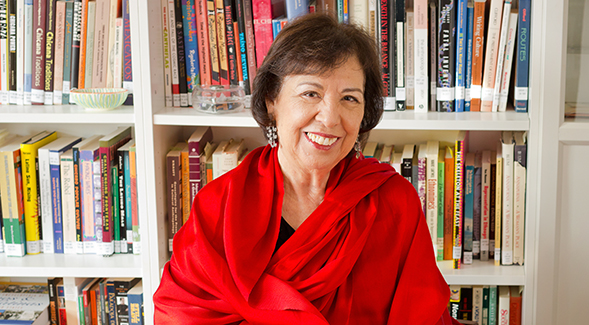Norma Elia Cant to Kick Off Hispanic Heritage Month
The renowned scholar and poet will deliver a keynote address Sept. 15 for the new campuswide celebration.

Norma Elia Cantú said her message to SDSU’s Latinx, Chicana and Hispanic students in her upcoming Hispanic Heritage Month keynote address is a simple, time-honored rallying cry: “Sí, Se Puede.”
“If others can do it, you can do it,” said Cantú, a celebrated and nationally renowned academic, author, and poet and current faculty member at Trinity University in Texas.
“There sometimes might be pressure that maybe you don’t belong or that maybe you feel you’re not good enough, but really, why not?” Cantú said. “If you dream it, you can achieve it. It takes work, and it’s not going to be handed to you, but if you really want it, it can happen.”
Cantú’s virtual address, which is set for 4 p.m. Sept. 15 (register here), kicks off a special Hispanic Heritage Month celebration at San Diego State University. For the first time, the school is taking a centralized approach to the monthlong celebration with a main calendar of events under the theme “Celebrando Nuestras Raíces/Celebrating Our Roots: Honoring Our Culture, Embracing the Future Celebration.”
The celebration includes all of the events being held by various campus departments and organizations. It is one of several steps that the university is taking as part of its strategic plan initiative. One of the plan goals is to leverage its designation as an Hispanic-Serving Institution (HSI) — a federal designation that makes SDSU eligible for additional federal funding provided it maintains a 25% Hispanic undergraduate population, among other criteria — to achieve its long-term institutional goal of being a R1 Doctoral University.
A task force of key university stakeholders in 2019 and 2020 explored ways that the university might honor its HSI designation beyond maintaining the enrollment levels. It recommended that the university bring more attention to the designation and strategically find ways to create a sense of belonging for Hispanic students, faculty and support staff on campus and a sense of pride in that designation.
“I think Hispanic Heritage Month is one of the many opportunities to achieve those goals,” said Emilio Ulloa, a psychology professor and associate chief diversity officer for HSI and regional affairs who was involved with the HSI Task Force. Ulloa also co-chaired the Hispanic Heritage Month planning committee with Latinx Resource Center Director Yesenia Sánchez.
“This is the first year we can say as an institution that we are taking this more unified approach in celebrating Hispanic Heritage Month, and as a result, there are more opportunities for collaboration and centralization despite the challenges of the current pandemic,” Ulloa said.
One of those opportunities was having Cantú deliver the keynote address. Cantú said one of the things that intrigued her about the speaking engagement was the fact that it marked an inaugural event for the university.
The planning committee solicited nominations campuswide, looking for guest speakers who could speak to the importance of celebrating culture and to the theme of roots and how they pertain to the Latinx community in the context of the struggles they have gone through, are going through and the future ahead of them.
Longtime SDSU English and comparative literature professor William Nericcio nominated Cantú.
“She really matched all the criteria we laid out,” Ulloa said.
Cantú was also impressed at SDSU’s commitment of embracing its HSI designation, a move she said is long overdue for institutions.
“I know SDSU is one of those campuses that prides itself in that way, and I think this celebration is a great step forward in the right direction,” she said.
The award-winning laureate will use poetry from poets from different time periods to highlight the resilience of the Latinx community and how through that resilience, families have overcome oppression and systemic injustice and inequality.
“The address will look at the past, the present and future, and how we can achieve a brighter future by remembering those words of Dolores Huerta, ‘Sí, Se Puede,’” Cantú said. “I know it sounds cliche, but it works. The undergrads will get it.”



